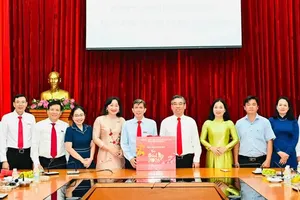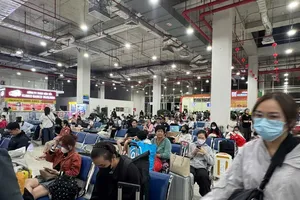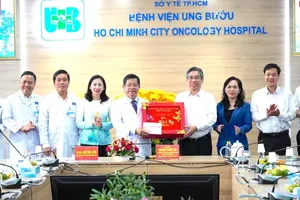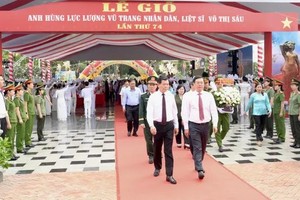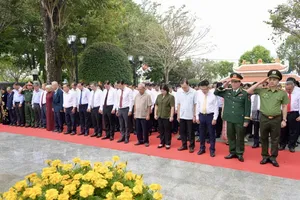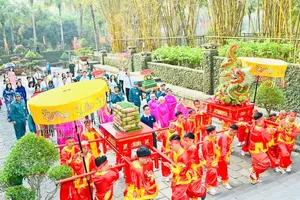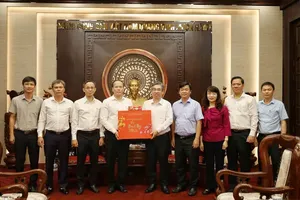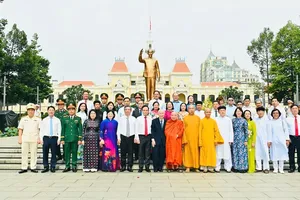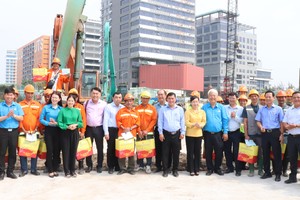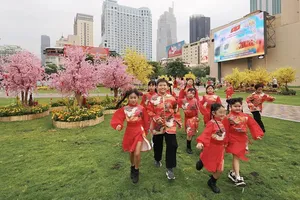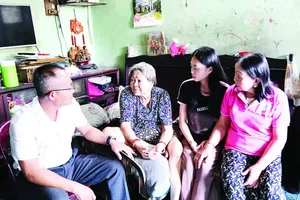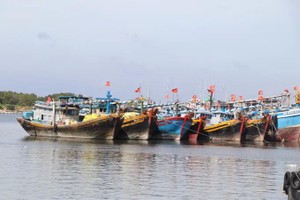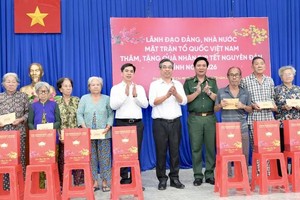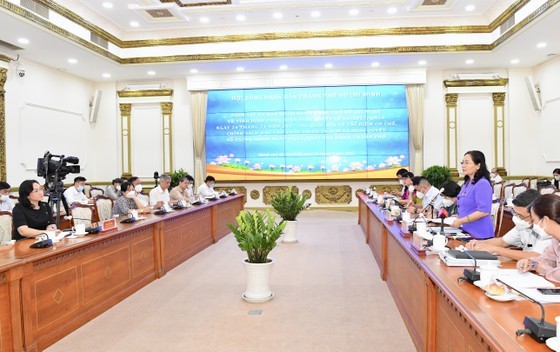 At the meeting (Photo: SGGP)
At the meeting (Photo: SGGP)
On the morning of May 10, the People's Council of Ho Chi Minh City organized to supervise the city People's Committee on the implementation of Resolution No. 54/2017 of the National Assembly on piloting specific mechanisms and policies for the development of the southern metropolis and Resolution No.25 of the People's Council.
In a brief report on the implementation of Resolution 54, Deputy Director of the Ho Chi Minh City Department of Finance Nguyen Tran Phu said that the municipal People's Committee has directed the Department of Natural Resources and Environment to review and make a list of projects to change the purpose of rice cultivation to submit to the People's Council of Ho Chi Minh City for approval of 32 projects that have changed the use purpose of over 10 hectares of rice land with a total area of more than 1,843 hectares. If the city is given more power in changing the purpose of projects using more than 10 hectares of rice land helps, it will shorten the implementation time and speed up the implementation of projects, ensuring the implementation of the land use plan every year effectively creating resources for socio-economic development of the southern largest city.
With the adoption of the policy towards additional income for staff, civil servants, and public employees, the additional income adjustment coefficient from 2020 to the end of the pilot period according to Resolution 54 is 1.2 times the maximum salary according to Resolution 54. The increased income of staff, civil servants, and public employees in state organizations has contributed to improving the lives of these people, evoking creative labor spirit, and improving working efficiency; however, it must be transparent and suitable to the city’s conditions.
Ho Chi Minh City was determined in its proposal for the scheme to increase the city's budget regulation rate in the 2021-2025 period and the 2025-2030 period and it has submitted the contents of the scheme to related agencies and ministries. As a result, the National Assembly passed a Resolution on central budget allocation in 2022; in which, the NA agreed to increase the city's budget retention rate to 21 percent.
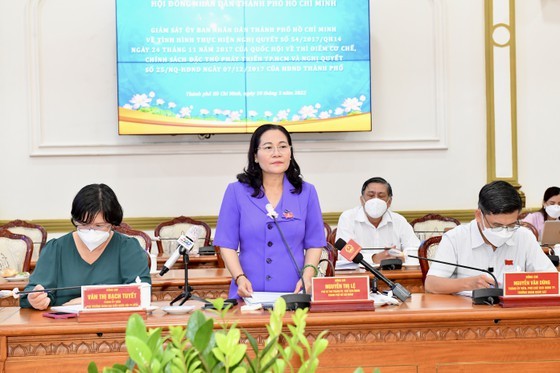 Chairwoman of the People's Council of Ho Chi Minh City Nguyen Thi Le speaks at the meeting (Photo: SGGP)
Chairwoman of the People's Council of Ho Chi Minh City Nguyen Thi Le speaks at the meeting (Photo: SGGP)
The City People's Committee has also issued Resolution 17 on the policy of attracting and developing a team of experts, scientists, and people with special talents for the field the City needs in the period 2019-2022. Up to now, Ho Chi Minh City has attracted 5 experts and scientists.
Assessing that the continued pilot implementation of specific mechanisms and policies plays an extremely important role in helping the southern metropolis better promote its potential advantages and develop sustainably, the People's Committee of Ho Chi Minh City proposed the National Assembly consider the promulgation of a Resolution to replace Resolution 54 so that the city can continue to implement specific mechanisms and policies.
Speaking at the conclusion of the monitoring session, Ms. Nguyen Thi Le assessed that, after more than 4 years of implementation, the Resolution 54 has brought into play certain results. Specifically, in the field of land management, the implementation of Resolution 54 has shortened the time to prepare dossiers to seek opinions from ministries before submitting them to the Prime Minister. In the field of investment management, the municipal People's Council has approved three resolutions and decided on investment policy in five groups A projects using the city budget with a total investment capital of more than VND12,900 billion and adjusted the scale and total investment of a project from group B to group A in order to speed up project implementation, manage and promote effectively local budget capital in public investment.
The authorization mechanism has helped departments, agencies, and people's committees in districts to be proactive in organizing and performing assigned tasks, promoting the role of agencies' leaders in management and administration; subsequently, it has raised officials, public servants, and public employees’ sense of responsibility when performing their duties. Besides, the implementation of additional income expenditure for them has created motivation, contributed to alleviating difficulties, and improved their lives.
However, a number of implementation contents are still behind the expected plan, specific mechanisms and policies have not been promoted, fully and promptly implemented as expected. In the field of land management, although the time to prepare the documents has been shortened, the subsequent processes and procedures are still slow, so all projects have not been completed on schedule.
Above all, the municipal People's Committee has not been resolute in making decisions to adjust and cancel projects that have not been implemented out of the annual land use plan. All six group A projects implemented under the specific policy mechanism of Resolution 54 are also behind schedule. For example, the construction investment project of Tran Quoc Hoan Street so far has not been able to determine the compensation land boundary, and cannot accept the handover of defense land; therefore, the land use purpose has not been changed, and been implemented the resettlement area of the project.
Up to now, HCMC has not increased tax rates on a number of goods subject to excise tax as well as has not yet generated revenue from land use levy when selling public properties attached to land managed by central agencies, organizations, and units in the city from equitization and divestment of state capital.
The remaining source of salary reform has not been used to increase investment, procurement, and professional activities, but mainly for additional income. Nevertheless, the additional income of staff, civil servants, and public employees of the city management has not yet reached 1.8 times the salary level and position. The policy to attract experts, scientists, and people with special talents has not met expectations, except that only one expert has signed a contract to work with the Saigon Hi-Tech Park.
From these assessments, Chairwoman of the People's Council Nguyen Thi Le suggested that the People's Committee pay attention to and resolve the recommendations of the Transportation Works Construction Investment Project Management Authority of Ho Chi Minh City and the Construction Investment Project Management Board of Civil and Industrial Works in order to speed up the implementation of the project to build a road connecting Tran Quoc Hoan Street - Cong Hoa Street and the T3 terminal of Tan Son Nhat Airport and the Phu Tho circus and multi-purpose performance project. At the same time, city authorities must review the implementation status of each project with more than 10 hectares of rice land acquired, consider the feasibility, the necessity to continue implementing to speed up progress or submit it to the People's Council of Ho Chi Minh City to cancel the list to ensure residents’ legitimate rights and interests.
Ms. Le also asked the Ho Chi Minh City People's Committee to analyze the causes, especially paying attention to subjective causes, and determine the content that needs to be adjusted. According to her, these causes will be used as a basis for Ho Chi Minh City to continue to propose the National Assembly issue a new resolution on mechanisms and policies for city development. During the studies for developing a new resolution, it is necessary to prepare plans, solutions, specific roadmaps, and resources for implementation. This aims to avoid repeating difficulties when implementing mechanisms such as Resolution 54, and at the same time to make the most of new mechanisms and policies.
Among the recommendations, the Ho Chi Minh City People's Committee proposed the National Assembly add to the Resolution by replacing Resolution 54 a chapter on the specific development mechanism of Thu Duc City. In particular, the city is expected to strengthen self-responsibility through decentralization and strong authorization of state management functions and tasks from Ho Chi Minh City to Thu Duc City.
Specifically, the People's Committee of Thu Duc City should be allowed to perform state management functions under the jurisdiction of departments in the fields of investment planning, finance, natural resources and environment, planning - architecture, construction, healthcare, education, and transportation. For investment projects in the construction and repair of infrastructure in which people and businesses contribute less than 100 percent, the state prioritizes allocating the rest of the budget so that the works can be completed soon.
Regarding the number of administrative staff, Ho Chi Minh City proposed to allow to actively assign payroll to the People's Committee of Thu Duc City, arrange the number of staff in the Thu Duc city government sector in 2025 up to 3/4 of the number of staff assigned to three districts including 2, 9, Thu Duc before the merging and gradually decrease each year. Meanwhile the number of vice chairmen of Thu Duc City People's Committee will be no more than four.
The People's Committee of Ho Chi Minh City also proposed the Government amend, supplement or issue a decree to replace Decree 93/2001 on decentralization of management in some areas for HCMC. Specifically, it proposed to be allowed to proactively decide on the addition of the total capital and the list of public investment projects in the medium-term public investment plan for the 2021-2025 period on the principle of ensuring that there is no increase in local budget’s overspending, does not generate basic arrears. At the same time, it should be allowed to select contractors and investors for large-scale key projects without bidding. Last but not least, the city expected the government to allow pilot socialization of investment in parks, schools, hospitals, and sports centers in new urban areas.
In the field of finance - budget, Ho Chi Minh City proposed to continue to keep the retention rate of 21 percent for the period 2023-2025.
Ho Chi Minh City also suggested that the People's Committee of Ho Chi Minh City could, based on the characteristics of the situation, practical requirements, and the city's budget, be allowed to arrange and increase the number of staff and civil servants in densely populated wards and communes.
